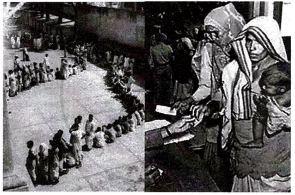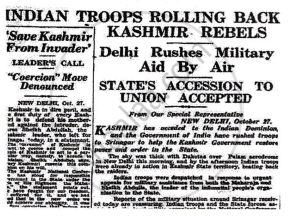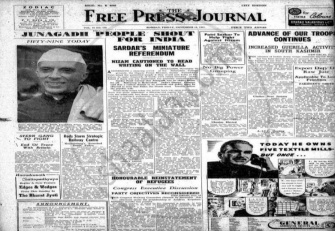Advertisements
Advertisements
Mention any two reactions each of the Congress and the Muslim League to the Cabinet Mission Plan.
Concept: Congress and League Reaction
What was the most significant change made by the Mountbatten Plan in the Cabinet Mission Plan proposals?
Concept: The Cabinet Mission Plan Proposals
The African leader imprisoned by the British government for twenty-seven years was ______.
Concept: Changed Attitude of British Government
On the morning of June 3, 1947, the day the partition was announced, Mahatma Gandhi told Rajendra Prasad, “I can see only evil in the plan”.
- Identify the Plan that Mahatma Gandhi was referring to? State any three clauses of the Plan.
- Discuss any four reasons for the acceptance of the plan by major political parties of India.
Concept: The Mountbatten Plan
Name any two states whose union with India involved armed intervention by the Indian army.
Concept: The Foundation of Indian Democracy
Name two major political parties that played an important role during the General Elections of 1967.
Concept: The Foundation of Indian Democracy
Which state was formed in 1953, on the basis of linguistic identity?
Concept: Redrawing of the Map of India on the Basis of Linguistic Identity
The first General Election in India (1952) was a landmark event in the history of independent India. Discuss.
Concept: Significance of the First General Election Based on Universal Adult Suffrage (1952)
Name the Indian nationalist leader who played a vital role in the integration of princely states with the Indian Union.
Concept: Integration of Princely States with Specialreference to Junagarh and Hyderabad
Mention the principle on which the first general election in India (1952) was based.
Concept: Significance of the First General Election Based on Universal Adult Suffrage (1952)
Answer the following question.
Name the activist who undertook an epic fast unto death for a separate Andhra State.
Concept: Movement for Linguistic Reorganisation with Particular Reference to Andhra, Bombay and Punjab
Answer the following question.
The first General Election in India (1952) was a landmark event in the history of independent India. Discuss.
Concept: Significance of the First General Election Based on Universal Adult Suffrage (1952)
The first General Election in India in 1952 was based on the principle of ______.
Concept: Significance of the First General Election Based on Universal Adult Suffrage (1952)
With reference to the image shown below, explain the results and the significance of the First General Elections in India in 1952.

Concept: Significance of the First General Election Based on Universal Adult Suffrage (1952)
Which war is being referred to in the image of the news extract given below? Briefly explain any three causes of this war.

Concept: Origin of the Kashmir Problem
The Elections of 1977 brought a non - Congress government to power in India for the first time since Independence.
In the context of this statement, briefly discuss the following:
Any four policies of the new non-Congress government.
Concept: Problems of Preparation and Their Solutions, Process, Result and Impact of the Elections
The Elections of 1977 brought a non - Congress government to power in India for the first time since Independence.
In the context of this statement, briefly discuss the following:
Any four major drawbacks that led to the downfall of this government.
Concept: Problems of Preparation and Their Solutions, Process, Result and Impact of the Elections
The first Lok Sabha election was held on the principle of ______.
Concept: Significance of the First General Election Based on Universal Adult Suffrage (1952)

With reference to the news extract given above, state any four circumstances that led to the fulfilment of wishes of the people of Junagadh and its eventual accession to the Indian union.
Concept: Integration of Princely States with Specialreference to Junagarh and Hyderabad
Name the leaders of India and Pakistan between whom the Tashkent Agreement was signed (1966).
Concept: Appointment of Lal Bahadur Shastri in 1964 and Indira Gandhi in 1966 as Prime Minister
